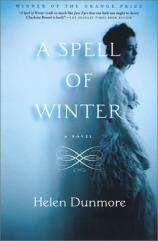Reading Group Guide
Discussion Questions
A Spell of Winter

1. A Spell of Winter is considered a literary Gothic novel. When it began in the late-eighteenth century, Gothicism emphasized experiences connected with subterranean dungeons, secret passageways, bloody hands, ghosts, graveyards, etc. What motifs does the author use to create this atmosphere? Which eerie features are grounded in reality? Which ones are mysterious?
2. The author begins the novel with a flashback of Kate delivering a scary story by the fire to Rob and Cathy (pp. 1-5). What is Cathy's reaction? Discuss the concept of a narrative being pleasurably terrifying. Why do you think people enjoy being scared by stories?
3. Comparing herself to the beautiful Livvy, a dowdier Cathy thinks: "I was too like my mother. My face made people think of the things men and women did together in the dark" (p. 66). What does she mean? What kind of face forces people into shame? Contrast this with the shame that Miss Gallagher attempts to stir up in people.
4. Throughout the text, the reader encounters graphic descriptions of smells-numerous flowers, perspiring bodies, dry rot, lemons, the fresh sweat of a horse, and so on. What literary purpose do these all these olfactory references serve? When telling Cathy a story about their father, Rob says: "I remember...because when I came in you were sitting by the fire and room smelled of rosemary" (p. 111). Clearly, smells assist (and can trigger) memory. What else boosts memory in this story and why is it so important?
5. Both servants fiercely guard the mysteries of the family heritage from Rob and Cathy. This inverts common behavior, resulting in outsiders who are better informed about the family than the family itself. What effect does this have on Cathy? Rob?
6. Having abandoned her family, the mother remains a topic mostly avoided by the men at the estate. But Cathy has difficulty forgetting (and forgiving). After Cathy's abortion, she recalls a poem about a women's stillbirth: "A mother, a mother was born" (p. 196). What does this mean to Cathy? How does the abortion affect Cathy's bond with her mother? Contrast this with Cathy's feelings toward her father.
7. When closely observing the paintings of Richard Tandy, Cathy notices that "the sky was so pale, it dazzled, and behind the wood there was a heap of hills, purple as damsons" (p. 86). Intrigued by the style, she suggests it represents a different "reality" and a different "language." Why did Mr. Bullivant want Cathy to see these works? In what kind of reality does Cathy exist?
8. The author makes great use of closed spaces: the "snow-house" where the first incestuous union occurs (p. 99); the little "cottage" where the abortion takes place (p. 185); the tiny "clearing" where Miss Gallagher dies (p. 203). What relation do these physical landscapes have to the country estate? How do they correspond to the emotional landscape of the characters? Can you think of other enclosed spaces to which the author might be alluding?
9. "Blood seeped rustily out of me.... I thought I would never stop bleeding" (189). These are the words of Cathy after her abortion. Blood is mentioned numerous times in the text. Give more examples. Why did the author choose blood as a definitive symbol?
10. The novel takes place at the turn-of-the-century, when modernization is beginning to sweep across Europe. Confronted with new comforts like indoor heating at Ash Court, Cathy thinks: "I wondered if I would miss our alternations of roasting and shivering, which were as natural to us as the squeeze and swell of our hearts" (p. 80). How does this call into question the very idea of what is "natural"? Consider how modernization has changed, and sanitized, our subjection to bodily functions. Do you think this displacement makes it difficult for characters in a modern setting to have the same Gothic sensibilities as those of characters in A Spell of Winter?
11. Chapter 18 begins with Kate packing to leave, simply saying: "It's never been my home" (p.223). Do you agree with this? Ownership of the estate, in strictly metaphorical terms, figures prominently throughout the text. How does Cathy feel about the home? What about Grandfather? Rob? Miss Gallagher? How do the characters' feelings toward the house influence their eventual outcomes?
12. Mr. Bullivant offers Cathy glimpses of a larger world, and Kate urges her to leave the estate, but she cannot bring herself to act in response. She even states that she's "not sure about anything" except staying at the house (p. 253). Why is Cathy so attached to a house with bad memories? What does this suggest about her psychological complexity?
13. When Rob breaks his leg, Cathy firmly confronts her grandfather: "I saw what he saw: my set, sullen face, my big hands. I was capable and I knew I was. I could inflict my will on him" (p. 164). Much is made of Cathy's physical attributes in this passage. Does her stature affect her personality? Discuss the role her physicality plays later in life, when only she and her grandfather are left on the farm. What's the significance of Grandfather shouting they should "CHERISH...one another"? (p. 265)
14. Scenes of madness are prominent plot devices in this novel. From the helpless father to the domineering governess, or even the exuberant Mr. Bullivant, the reader encounters off-kilter behavior. Give examples of when Cathy's sanity could be called into question. Which characters are the most stable? Which character is accused of madness without the reader experiencing it firsthand?
15. When Rob returns from Canada, Cathy no longer lusts after him—"I no longer wanted what he wanted" (p. 276)-and in France, before meeting her mother, she experiences genuine happiness-"It makes me want to laugh. And as if he senses it, he gives me a smile...(p. 300). Discuss what prominent changes had to occur before Cathy could establish this outlook.
16. Everyone, including Cathy, compares herself to her mother. By the story's end, do you think this comparison is warranted? Why or why not?
17. There are a number of mothers and mother figures in A Spell of Winter. Cathy has three "mothers"—Kate, who is affectionate, dependable, but in the end more centered on her own life than on the lives of the children; Miss Gallagher, who is a fairytale "bad mother," possessive, dangerous and yet pathetic; and finally Cathy's real mother, Cynthia, who is absent and mysterious and does no mothering at all as far as we can see, and yet is both idealized and mourned by her daughter. What do you think the author is suggesting about our notions of mothering and motherhood? What steps seem to be necessary in order to launch a successful mother and child relationship?
A Spell of Winter
- Publication Date: January 9, 2001
- Genres: Fiction, Literary Fiction
- Paperback: 320 pages
- Publisher: Grove Press
- ISBN-10: 0802138764
- ISBN-13: 9780802138767







